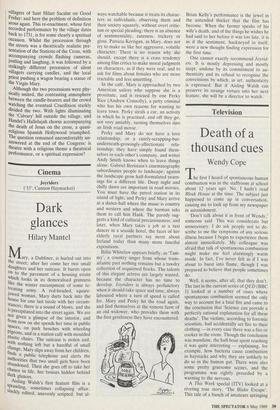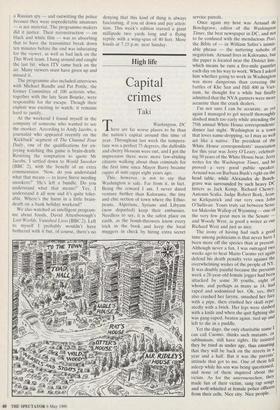Television
Death of a thousand cues
Wendy Cope
he first I heard of spontaneous human combustion was in the staffroom at school about 12 years ago. No, I hadn't read Bleak House at the time. The subject just happened to come up in conversation, causing me to look up from my newspaper in astonishment.
'Don't talk about it in front of Wendy,' someone said. This was considerate but unnecessary. I do ask people not to de- scribe to me the symptoms of any serious illness because I begin to experience them almost immediately. My colleague was afraid that talk of spontaneous combustion might make me feel alarmingly warm inside. In fact, I've never felt as if I was about to burst into flame, though I was prepared to believe that people sometimes do.
Well, it seems, after all, that they don't. The last in the current series of QED (BBC 1) looked at a number of cases where spontaneous combustion seemed the only way to account for a fatal fire and came to the conclusion that 'Science can provide a perfectly rational explanation for all these deaths'. The victims, according to forensic scientists, had accidentally set fire to their clothing — in every case there was a fire or cooker in the room. Though the conclusion was mundane, the half-hour spent reaching it was quite interesting — explaining, for example, how bacteria cause combustion in haystacks and why they are unlikely to do so in the human gut. There were also some pretty gruesome scenes, and the programme was rightly preceded by a warning to the nervous.
A This Week special (ITV) looked at a riveting true story, 'The Blake Escape'. This tale of a bunch of amateurs springing a Russian spy — and outwitting the police because they were unpredictable amateurs — is ace material. The programme-makers did it justice. Their reconstruction — on black and white film — was so absorbing that to have the transmitter break down ten minutes before the end was infuriating for the viewer, as well as bad luck on the This Week team. I hung around and caught the last bit, when ITV came back on the air. Many viewers must have given up and missed it.
The programme also included interviews with Michael Randle and Pat Pottle, the former Committee of 100 activists who, together with the late Sean Bourke, were responsible for the escape. Though their exploit was exciting to watch, it remains hard to justify.
At the weekend I found myself in the company of someone who wanted to see the snooker. According to Andy Jacobs, a journalist who appeared recently on the 'Kickback' segment of The Channel Four Daily, one of the qualifications for en- joying watching this game is brain-death. Resisting the temptation to quote Mr Jacobs, I settled down to World Snooker (BBC 2), with the benefit of an extra commentator. 'Now, do you understand what that means — to leave Steve needing snookers?' He's left a bundle. Do you understand what that means?' Yes, I understand it all now and it's quite toler- able. Where's the harm in a little brain- death on a bank holiday weekend?
We also watched an intelligent program- me about fossils, David Attenborough's Lost Worlds, Vanished Lives (BBC 2). Left to myself I probably wouldn't have bothered with it but, of course, there's no
denying that this kind of thing is always fascinating, if you sit down and pay atten- tion. This week's edition starred a giant millipede two yards long and a flying reptile with a wing-span of 40 feet. More fossils at 7.15 p.m. next Sunday.



















































 Previous page
Previous page